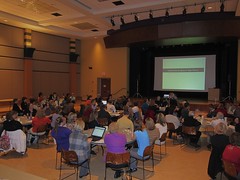In May 2011, Provost Rodney Erickson charged the members of the Instructional Space Task Force to “develop and communicate a shared set of norms and expectations for scheduling classes” at Penn State. These norms and expectations should “serve students, meet the needs of faculty, and make effective use of our classroom facilities.”
The Task Force members have spent the past year gathering data on course and instructional space scheduling through a variety of means including town hall meetings, meetings with constituent groups of students, and meetings with staff, such as the campus registrars. In addition, we hosted a blog where people could share their questions, thoughts and experiences related to our current approach to scheduling in instructional spaces throughout Penn State. Through this process we learned that while scheduling works pretty well, there is a great deal of frustration at all levels: students find that the classes that they need to schedule are offered competing time slots since scheduling is decentralized, staff with scheduling responsibilities are often frustrated by demands that they cannot meet unless the circumvent procedures, some faculty have little flexibility over when they teach, and curricular innovation is hampered through the course schedule rollover.
From this broad, year-long discussion of the principles, values and priorities that ought to inform Penn State’s course scheduling policies, four priorities emerged namely that Penn State courses should be scheduled in a way that:
- Maximizes student success by enabling timely degree completion;
- Cultivates innovative pedagogical practices;
- Balances faculty teaching schedules with the pursuit of rigorous scholarly research;
- Ensures the transparent, fair and efficient use and allocation of space resources across colleges and campuses;
These four priorities reinforce Penn State’s core commitment to being, first and foremost, a research university that is focused on student success. In addition, these priorities are designed to further the values and goals articulated by Penn State’s strategic plan.
In alignment with these four priorities, the Task Force presents four recommendations. These are divided into both short- and long-term recommendations, recognizing that it may not be possible to implement the long-term recommendations until a new scheduling system is in place, which will be part of the new student information system.
Recommendation One: Currently, course scheduling is very decentralized as each academic unit schedules its own courses. While this works well to meet departmental and faculty needs and preferences, it can inadvertently penalize students by scheduling required courses at the same time. The Task Force therefore recommends that certain courses be centrally scheduled to minimize conflicts between these courses. The determination of these centrally scheduled courses would be made by an analysis of recommended academic plans for each major and by discussions with the departments and colleges involved. The long-term goal would be to move to software that can determine the curricular needs of our students in upcoming semesters in order to ensure that students have access to the courses they need to graduate.
Recommendation Two: Courses are now scheduled through the roll-over process, which duplicates the schedule of a previous semester. Department administrators then assign faculty to courses within this schedule. This process restricts the ability to schedule new courses and to engage in pedagogical and curricular innovations, even while it produces some efficiencies. The Task Force recommends that after meeting student needs, scheduling priority should be given to faculty actively engaged in the research and scholarship of pedagogy and who are committed to integrating new practices of teaching that encourage students to be collaborative participants in the educational process. Guidelines to recognize such innovation will need to be established.
Recommendation Three: Current standard scheduling periods require that faculty teach on either a Monday/Wednesday/Friday or a Tuesday/Thursday sequence. In order to meet research demands, many faculty opt to teach on the Tuesday/Thursday cycle, which leads to a bunching of courses on these days. Additionally, many faculty request additional irregularly scheduled course periods on Monday/Wednesday that cause difficulty for students since these classes stretch across two class periods. The Task Force recommends the adoption of additional standard scheduling periods (Appendix 4) that allow for more flexibility in teaching schedules, ensure that courses are more evenly distributed across the days of the week, and enable faculty to balance their teaching and research responsibilities.
Recommendation Four: In order to provide students and faculty with engaging learning environments it is vital that we continue to improve existing classroom spaces and to construct new spaces. The Task Force recommends that we continue to expand and improve our base framework of general purpose classrooms and focus on ensuring that the condition, learning environment, technology and availability of these spaces enhances the educational experiences for our faculty and students. A robust inventory of high quality classrooms will meet the pedagogical needs of our students and faculty and reduce the amount of “gaming” that currently exists in order to secure “good” classrooms. As noted above, the full implementation of these recommendations requires the adoption of a new scheduling system capable of anticipating student course offering needs, of enabling scheduling flexibility and innovation, and of managing complex scheduling periods. In addition, the above four recommendations require changes to current policies and procedures. The Task Force provides specific recommended changes to current policies and procedures that we believe will bring us closer to our four goals and will begin to effect the changes necessary to shift the culture of scheduling and develop new shared norms that place students at the heart of course scheduling (Appendix 5). However, we also recognize that longer term, after a new scheduling system is in place, policies and procedures will need to be created or revised to fully achieve the goals outlined in the ISTF Final Report.

